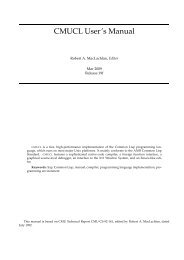current-threadThis returns the object for the current thread.alive-threadsFunctionFunctionThis returns a list of threads that are currently alive. One thread that is certain tobe a member of (alive-threads) is (current-thread).yield-processorFunctionThis is an hint to the scheduler that this is a good time to change state of the currentthread from running to ready and allow other thread to run in the processor thatthe current thread is running.TD: How does the function cl:sleep behave?TD: What about the scheduler?TD: How does the garbage collector behaves in relation to unreachable and blockedthreads?(make-thread #’(lambda ()(let ((m (make-lock)))(acquire-lock m)(condvar-wait (make-condvar m)))))Each thread has a priority, a number between −5 and +5, that is an indicationto the scheduler of how important it is that the thread be chosen to runwhen there are several threads ready and not enough CPUs for them all. Largerpriority numbers represent more important threads. This can be ignored by theimplementation.thread-priority threadFunctionThis returns the priority of thread; it is a value between −5 and +5. This can bechanged with setf. The argument for the setf form must be an integer between−5 and +5.Note that the value you specify with setf might not be the one you get back:in an implementation that does not support priorities, thread-priority mightalways return 0, for example.4
Mutual exclusion locksOne way to protect a thread from interference from other threads when it is runningin a critical region for some resource is to disallow any other thread to enter a criticalregion for the same resource.A mutual exclusion lock, or simply lock, is an device that supports sharingof resources common to several threads by mutual exclusion. They protect criticalregions of code where only one thread at a time can be running. It is thus guaranteedthat there are no concurrent accesses to the resource.A lock is an object that a thread can acquire, in order to claim exclusiveaccess to a shared resource. We then say that the lock is owned by the thread thatacquires it. A lock not owned by any thread is unowned. After the thread is donewith the resource, it releases the lock. An attempt to acquire a lock only succeedsif the lock is unowned. When a thread attempts to acquire a owned lock, it blocksuntil the lock is released by other thread.A lock is fair when the order by which threads manage to acquire it is thesame as the temporal order that the request is done. Although implementations areencouraged to implement fair locks, this specification does not require that they do.There are two major kinds of locks: recursive and non-recursive. A recursivelock is one that can be recursively locked by any thread. When a thread recursivelyacquires the lock, it must be released an equal number of times to really release thelock. A non-recursive lock is one that does not allow recursive locking: if a threadtries to acquire a lock that it is already owned by itself the thread either deadlocksor the acquiring fails.make-lock &key name (kind :errorcheck) &allow-other-keys FunctionThis creates and returns a new, unowned lock. The argument kind can be one of:errorcheck, :no-errorcheck, or recursive; it is an error if it is any other object.acquire-lock lockFunctionThis acquires lock. If lock is already owned by other thread, then the current threadblocks until lock becomes unowned. If lock is already owned by the current thread,what happens depends on the kind of lock. In a recursive lock, the lock is ‘reacquired’,and it must be released an equal number of times; in a :errorchecklock, a condition lock-deadlock-error is signaled; in a :no-errorcheck lock thecurrent thread deadlocks. This function returns an unspecified value.try-acquire-lock lockFunctionThis tries to acquire lock. If lock is unowned, it acquires lock and returns t; otherwise,it returns nil. In a recursive lock that is already owned by the current thread,this function succeeds in re-acquiring the lock and it returns t. In a non-recursivelock that is owned this function returns nil.timed-acquire-lock lock timeoutFunctionThis tries to acquire lock until it manages to acquire it or until timeout secondselapse, whichever comes first. If it manages to acquire the lock, the function returnst; otherwise it returns nil.The accurrecy of timeout is unspecified, but implementations are encouragedto keep it under one second. One possible, although not the best, implementationof this function is5















